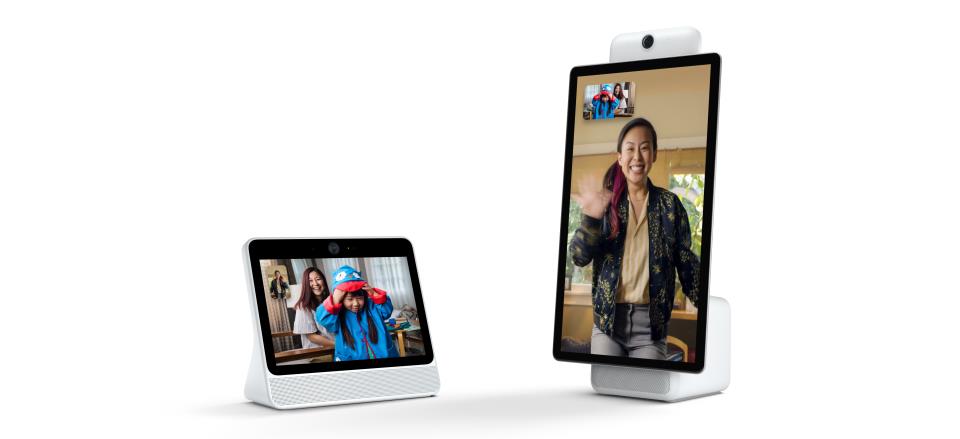Facebook launches Portal: is now the right time to be putting cameras into people’s living rooms?
For a full look at Facebook Portal in action, check out this video article from the BBC’s Silicon Valley correspondent, Dave Lee.
BBC
But for the purposes of time, let’s explain the product in this way: it’s a physical video calling device designed to evolve home communications beyond the likes of Echo Show or standard FaceTiming on your iPhone. It boasts the latest HD and AI technology, and there are two versions available – a 15 incher priced at US$349, and a 10 incher at $199. The artificial intelligence means that the camera follows you around room, making for an altogether more frivolous video calling experience than say an iPad, which without the AI bells and whistles is effectively what this new device is.
On the surface of things, this looks like a smart move. We’ve talked many times in recent months about the need for media companies to invest in physical world platforms, be that in the shape of events and experiences, or through tangible products such as the Apple iPhone, Amazon Alexa, or Nintendo Switch.
And certainly for Facebook, a company which incurred the biggest single day loss in US stock market history in July while iPhone-sale aficionado Apple was busy becoming a trillion dollar company, shifting a few physical units could well prove to be a useful way to stabilise the stock price, at least in the short-term.
Still, there’s no getting away from the fact that this particular product feels slightly bereft of innovation. Is it just an iPad with a swanky camera? Maybe. And for a company that has longsince built its name on digital advancements, jumping onto the physical hardware bandwagon at this stage feels a little, well, old skool. With software now available to facilitate video conferencing on pretty much any existing screen you can think of, why invest in the hardware of another one?
The Facebook bet on Portal appears to be being made on its advanced camera technology, and that raises a second problem.

TechCrunch reported the story yesterday under the headline, ‘Facebook, are you kidding?’ The sub-head was even more telling:
Facebook, champion of bad timing
As many users are looking for ways to compartmentalize or scale back their reliance on Facebook, the company has invited itself into the home. Portal is voice activated, listening for a cue-phrase (in this case “Hey Portal) and leverages Amazon’s Alexa voice commands, as well. The problem is that plenty of users are already creeped out enough by Alexa’s always-listening functionality and habit of picking up snippets of conversation from the next room over. It may have the best social graph in the world, but in 2018 people are looking to use Facebook for less — not more.
At a time when Facebook is still cleaning up the debris from the biggest data-breach in the company’s history, and Mark Zuckerberg is being paraded around Congressional hearings for all the world to see, an in-home Facebook video camera/voice activated device has been instantly met with privacy concerns. The brand is just not where it used to be.
Which is where the two main issues with Facebook Portal converge. In an age when people are looking to use Facebook and wider social media platforms less, the company’s attempt to invite itself round for a chat and a cup of tea in your living room for the rock bottom price of $199 (the latest iPhone is so far being touted round about the $1,000 mark) we are arguably now reaching a tipping point in the perception of the company from intimidating, to desperate.
Physical unit sales should mean a supple short-term revenue stream for the Facebook share-price, and right now Mark Zuckerberg knows that is what he needs to keep investors interested. But this is definitely the playing of a ‘Get out of Jail Free’ card by a company that is now in the Yahoo, rather than the Snapchat stage of its development. Ultimately, throwing an upgraded iPad at the situation is not going to be enough to save the brand, privacy concerns or no.
More like this
Media Voices podcast: Facebook WTF?
Facebook exits the newsroom: where does that leave publishers?
What now with Facebook and the digital media business model?
The relationship between publishers and platforms: fixing what was broken and other lessons
Dump Facebook publishing, boost revenue, adopt chatbots: media report
Facebook’s first print magazine – will it ‘Grow’ (or go up in smoke?)
Chart of the week: UK students rather check Facebook than traditional media for news









